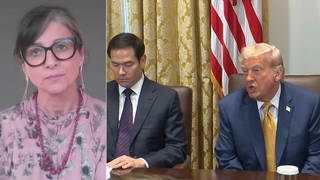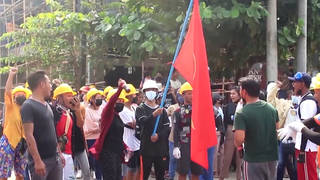
More than 500 people have been killed in Burma during protests against the February 1 military coup that toppled Burma’s democratically elected civilian government. At least 141 people were killed over the weekend alone, when soldiers opened fire on civilians demonstrating against military rule in dozens of cities and towns across the country. Children were among the dead, including a 5-year-old boy and a 13-year-old girl, according to Amnesty International. Burmese troops also fired on a funeral service for a 20-year-old student protester. “We wake up to more bad news every morning, more deaths,” says Aron Aung, a Burmese student studying at the New York Institute of Technology, who also describes how women are helping lead the resistance.
Transcript
AMY GOODMAN: We begin today’s show in Burma, where more than 500 people have been killed during protests against the February 1st military coup that toppled Burma’s democratically elected civilian government. At least 141 people were killed on Saturday alone, in the bloodiest day so far, as soldiers opened fire on civilians demonstrating against military rule in dozens of cities and towns across the country. Children were among the dead, including a 5-year-old boy, according to Amnesty International, and a 13-year-old girl. On Sunday, Burmese troops fired on a funeral service for a 20-year-old student protester killed near the commercial capital Rangoon.
The attacks drew condemnation from the European Union, United States, U.K. and Germany, with the U.N. special rapporteur for Burma accusing the military regime of mass murder. On Tuesday, U.S. Secretary of State Tony Blinken condemned the crackdown and called for international companies to consider cutting ties to enterprises that support Burma’s military.
SECRETARY OF STATE ANTONY BLINKEN: The people of Burma are speaking clearly: They don’t want to live under military rule. And that is evident from what we’re seeing and hearing and witnessing. … And we continue to call on the military regime to release all those people who have been unjustly detained; stop its attacks on civil society members, journalists, labor unions; halt the killings by its security forces; and return to power the democratically elected government. The United States is committed to working with its allies and partners to hold the perpetrators of these abhorrent acts accountable.
AMY GOODMAN: This comes as human rights activists are calling on international energy companies, like Chevron, to withhold revenues from natural gas projects they operate in Burma from the junta-controlled government.
Meanwhile, an estimated 3,000 people have fled southeastern Burma into Thailand after the Burmese military bombed areas controlled by the Karen ethnic minority group. At least 459 people, including at least 35 children, have been killed since the start of protests, according to rights groups.
Burma is also known as Myanmar. Military leaders changed the name to Myanmar in 1989 after brutally suppressing a pro-democracy uprising.
For more, we’re joined by Aron Aung. He is from Rangoon, the former capital of Burma, formerly known, that is now called Yangon. He came to the U.S. to attend college and is a senior at the New York Institute of Technology. His recent piece for the college’s newspaper, called the Manhattan Globe, is headlined “Misogyny Silenced, Feminism Amplified.”
Welcome to Democracy Now! It’s great to have you with us, Aron. And, first of all, I want to say you’re incredibly brave to come on this broadcast, to show your face. And I’m wondering if you can talk about what’s happening in your home country. Talk about your family and why you’ve chosen to do this first broadcast interview of your life.
ARON AUNG: So, as we all know, on February 1st, the military took over as a coup in my country. And ever since then — it’s been almost over two months now — so many people have died. So far, like you said, there have been 550 deaths, and that’s just an estimate, with a 7-year-old girl being one of the youngest victims, a 5-year-old boy recently. And the situation back home does not seem to be getting any better. There are some days where, like, you know, people have a little more hope, but most days it’s more gloomy.
Many of us abroad, we’re very worried about people back home. We wake up to more bad news every morning, more deaths. It’s just been chaotic. Everyone is really worried for my family, our families. But my family back home, they’re staying safe at home, staying indoors, you know, doing our best during these tough times.
JUAN GONZÁLEZ: And, Aron, I’m wondering if you could talk — you mentioned your family. Your parents themselves, have they talked to you about their participation, decades ago, in the 1980s, in the democracy movement then, what’s different about this movement versus the uprising of young people back then?
ARON AUNG: Right. So, I know that my parents, they were part of, like, the 1988 revolution, as so many people marched the streets back then. They’ve told me stories about their crackdowns back then. But the thing is, they also said that the protests back then, they lasted for only about two months, because there was like a huge military crackdown.
But the difference is that, back then, they didn’t have telecommunications and the internet like we do. Nowadays we’re all so connected. There’s a lot of young people who are also technologically more smart, that are like — now that we have a better sense of, like, sharing information, we know what to do, like, if we’re planning to do a certain protest today, things are happening, unlike back then, when they had no internet connections or phone calls, so they had to just hide at homes and, like, surrender to the coup. But what’s different about this time is that we’re all so connected, and everyone’s very angry. We’re not going to stop protesting. We’re not going to submit to this military regime. It’s time that they end and step down.
JUAN GONZÁLEZ: And I wanted to ask you a little bit in terms of the history of Burma, because the military has dominated the life of the country ever since it became independent. but it was, for 120 years, a colony of the British Empire. And the Burmese Army was, in essence, sort of created — wasn’t it? — during the Japanese occupation during World War II by the Japanese fascists. I’m wondering: What’s the responsibility of countries like the U.K. and the rest of the world as you are battling to reestablish democracy?
ARON AUNG: Right. So, the military is very deep-rooted in our history. Like you said, it was formed during the Japanese takeover in our country back then. And basically, they rose into power when we, quote-unquote, “won” independence from the British. So, what happened was, after we received independence, our father of independence, Bogyoke Aung San, he was assassinated, and the country kind of went into turmoil. There was no ruler, so the military stood up, and, like, they took over. And they have not given back the power to the people since.
So it’s very deep-rooted. And I believe that countries like the United Kingdom and Japan, all these countries, like, they do have a sense of responsibility, to a point, that this is a very deep-rooted issue, and they should be supporting the people in this modern world that we live in today.
AMY GOODMAN: Your piece in the Manhattan Globe, the New York Institute of Technology newspaper, begins, “I remember as a young boy, sitting in restaurants and neighborhood tea shops, hearing 'shh…' amongst the voices of conversations and the clinking chaos of spoons and ceramic cups. When a police or a soldier’s presence was detected, people would stop talking and try to ignore these men in uniforms. One can’t help but be intimidated by them.” Talk about growing up there and what your parents would say to you about what could be talked about, and now as you desperately try to reach your parents on the phone.
ARON AUNG: Yeah. So, I grew up under the military regime, basically born into it. And the world was just — thinking about it, it was a scarier time, but then, as a kid, I didn’t understand anything, right? Because we would be out in public — everyone’s scared of soldiers. I was just — I just thought soldiers were someone to be scared of, not loved or appreciated like in other countries, like the United States, where marines and soldiers are, like, congratulated, and everyone is like — even when you see military marines on the streets, people say, “Thank you for your service.” But that’s not the experience that I had in my country. Instead, we were taught to fear them.
“Democracy” is definitely not a word, back then, when I was growing up, to be talked about. Daw Aung San Suu Kyi, like, we couldn’t talk about her. We couldn’t bring up her name anywhere in public, because you never know who’s listening. Back then, undercover cops were a huge thing. So, even in like tea shops and restaurants, getting breakfast, it’s a huge thing. It’s a huge culture in my country to go to tea shops in the morning to, like, catch up and talk about the daily news and stuff. So they purposely would place these undercover cops in these tea shops and restaurants so that they can listen in to the citizens’ conversations, prosecute them at will, if they may. Yeah, so it was a very interesting, growing up, experience, if I look back to it now.
AMY GOODMAN: And you also write about the women-led revolution, which I don’t think people hear so much about, in Burma. You talked about Daw Aung San — you talked about Aung San Suu Kyi, who was detained by the military on February 1st at the time of the military coup. But the significance of who’s in the streets right now, Aron?
ARON AUNG: Yeah. So, a few weeks ago, we had the Htamein Revolution. ”Htamein” is like a sarong or a skirt worn by — a traditional sarong worn by the women of Myanmar. And our country has deep-rooted misogyny, just culture-wise. We have this idea called ”hpone,” which is the topic that I talked about in the second article that I wrote for school — ”hpone,” which is like — it’s the idea that men have a higher aura, or, like, not a physical, just like luck — right? — than women. So, this idea has been ingrained in all of us. But then, throughout — this has nothing to do with religion or anything; it’s just a cultural thing where we’ve been raised.
But with this revolution, a few weeks ago, women stood up to the frontlines. And women have been standing up in this revolution. Women have been on the frontlines. They’ve been showing men, they’ve been proving all these misogynistic men, that they have the power and they have — like, they can do what these men are doing. And so, they started going out on the — they protested, went out on the streets, tied their sarongs to sticks and waived them as flags proudly up in the air. They started tying their longyis and their undergarments on the street poles, because it’s also a belief that men are not to walk underneath these skirts, like women’s clothing items and stuff like that. So these soldiers were actually hesitant to cross these lines because there were women’s undergarments that were blocking the way. So they had to spend time taking them down, which bought protesters time to run away from them, hide from them. So, I’m just so happy with people’s creativities back home in the ways we protest and how we do it so seamlessly and peacefully.
JUAN GONZÁLEZ: And, Aron, about that issue of the peaceful protests, there have long been ethnic groups in different parts of the country that have resisted the control of the central government. And back in the British colonial period, the British actually pitted different ethnic groups within Burma against each other. I’m wondering how you sense the potential for the armed groups of the ethnic minorities to unite with the broader peaceful movement that has developed in the cities against the dictatorship.
ARON AUNG: Correct. Growing up, we were all taught — like, the news media portrayed these ethnic military groups as like rebel groups, right? So, until, honestly, up until the coup, I also believed that to be true. I just thought that they had these rebel military groups. But little did we know, now that they’re speaking up about it, and then now they’re — like, now we find out that this military ethnic cleansing has been going on for way too long, and the people of Burma were unaware of it in the major cities. But all they were trying to do is to protect their own people from the military.
And right now all the so-called rebel groups — but they are no longer rebel groups, they are fighting for us, they’re fighting for the people of Myanmar — they have been joining together to form our own military, to serve under the CRPH, which is the Committee Representing Pyidaungsu Hluttaw, which is the democratic government group that we, the people of Myanmar, have elected in the 2020 elections that have been overthrown.
AMY GOODMAN: Finally, are you afraid for your family back in Burma, Aron?
ARON AUNG: Very. I would like to think that they’d be safe inside their own homes, up until recently. But just seeing videos and news of them just barging into people’s houses with no respect for human life, it’s just, honestly — like, you never know what they will do. They’re targeting any activist, anyone, honestly. Like, who would go into a house to murder a 7-year-old child? You know?
AMY GOODMAN: Well, Aron Aung, I want to thank you for being with us and for your bravery in speaking out, a Burmese student who’s come to the U.S. for college, is a senior at the New York Institute of Technology. We will link to your pieces in the Manhattan Globe, among them, “Misogyny Silenced, Feminism Amplified.”
Next up, today is International Trans Day of Visibility. We’ll look at the wave of anti-trans laws that are being enacted across the country. Stay with us.












Media Options